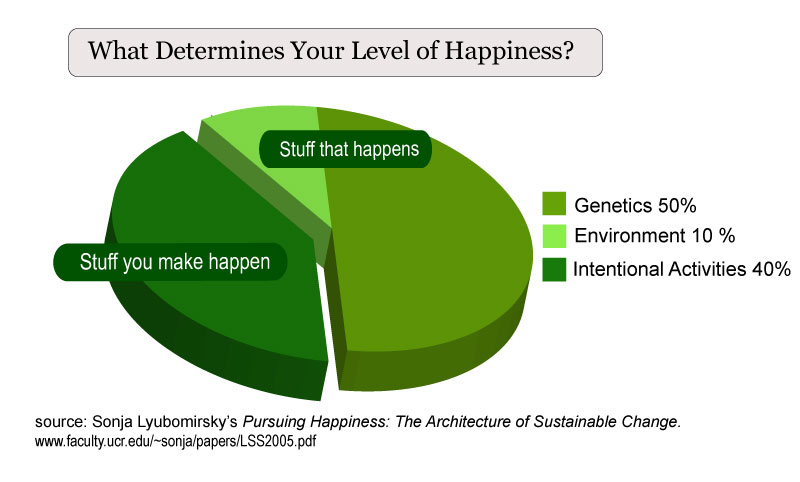Imagine being able to alter your body weight by 40%.
Craziness, you say? Sure, it’s crazy, but people do it all the time (over a period of years).
Want to hear something even crazier?
Your level of happiness is kind of like your body weight.
Both have base levels set by genetics. Over a long period of time, both are affected to some degree by the choices you make.
The difference? You want one to increase and another to remain around the base level.
How much control do we have over our happiness?
According to Dr.Sonja Lyubomirsky, a Positive Psychology researcher at University of California Riverside, your level of happiness is determined by three factors: genetic (50%), environmental (10%, and intentional activities (40%).

While 60% percent of our level of happiness is determined by stuff that happens, either by birth or surroundings, the remaining 40% is mostly under our control.
The things we do, the habits we develop, and the decisions we make all conspire to affect our overall happiness.
Since the research shows we can increase our happiness, I’m conspiring with some PhDs (okay, just putting together some of their findings) to bring you research-proven ways to increase your happiness.
Before we go on, a caveat: I’m not saying unhappy people are always at fault for their unhappiness. These numbers don’t account for outliers. Some people experience trauma and loss so tragic they never recover.
However, I am saying that the vast majority of people have the capacity to develop and cultivate higher levels of happiness.
With all that in mind, let’s look at 7 PhD-approved, fat-free ways to increase your happiness.
1. Find Flow
I’ve gone on and on about Dr. Csikszentmihalyi’s research into peak experience, and with good reason: people report ridiculously high levels of happiness, well-being and satisfaction when they experience flow on a regular basis.
To experience flow, you need a stimulating task or activity that is goal-oriented, provides feedback, and is adequately matched to your skill level. Flow-inducing activities include things like conversing, programming, sporting, working, writing, drawing, performing, gaming, etc. Link to the book
2. Stay Focused
Two researchers from Harvard recently found that a wandering mind is an unhappy mind [link]. Using an iPhone app that sent questions to people throughout the day, they found that people were most happy when they were more intensely focused on their task, no matter what that task was.
Happily, anyone can increase their levels of focus & concentration with a little effort. Check out 16 Ways to Increase Focus. Freelance creative people might also try the Pomodoro Technique.
3. Live Near Happy Friends
Remember that study about how real-life social networks affected obesity rates? Happiness is kind of like that.
Dr. Nicholas Christakis of Harvard Medical School found that happiness was contagious in the same way, spreading among people who lived close in close proximity to each other.
Quantifying your chances of happiness is a tricky thing, but that didn’t stop the authors from doing so: for each happy friend you have, you increase your likelihood of happiness by 9 percent; unhappy friends decrease this by around 7%.
4. Increase Your Social Connections
According to a study published in 2006 in the American Sociology Review, 25% of Americans have no one to confide in, and people now have considerably fewer close friends than they did two decades ago. Facebook friends don’t count. This is troubling because people report higher levels of happiness when they’re with other people.
Yet, people are measurably happier when they’re with other people…even introverts receive a boost from frequent social connections. While getting out there can be tough for some people, the benefit is always greater than the cost.
5. Have more sex
Dartmouth researcher David Blanchflower found that going from having sex once a month to once a week was, as far as happiness levels were concerned, equivalent to receiving a $40,000 annual bonus.
Since this is as obvious as Day Glo camouflage , allow me to throw in something totally counter to popular perception: to get more sex, consider getting married. In 2006, the Lancet published findings concluding that married people have more sex than singles.
6. Practice Daily Gratitude
In 2003, the Journal of Personality and Social Psychology published research that confirmed what the major religions have known for thousands of years: consciously focusing on blessings and expressing gratitude makes people happier. Dr. Robert A. Emmons, one of the authors of the study, wrote in a later book that practicing daily gratitude can increase your happiness by 25%.
You can start by keeping a gratitude journal; everyday, or even once a week, simply write down three to five things you’re grateful or thankful for. If you do a weekly review, this would be a great time to do this.
7. Reevaluate Your Priorities
A group of researchers recently examined 25 years worth of survey data of 60,000 Germans with an eye towards what made them happy. The results were published in the Proceedings of the National Academy of Sciences.
Their findings? The happiest people were those who pursued goals related to altruism, family life, religion, health, and a happy work-life balance. The least happiest were those who pursued goals related to their careers or material success. Not surprisingly, having a neurotic spouse was also quite detrimental to long-term happiness.
Over to You
What can you add to this list? What have I forgotten? Have you used any of these ways to increase your happiness (If #5, no details, please)? Please drop me a line in the comments and let me know.
출처: http://www.happenchance.net/7-phd-approved-ways-to-increase-your-happiness/
'Psychology' 카테고리의 다른 글
| [스크랩/반응] 처음 본 사람에게 “저 취업했어요”라고 말 걸면? (영상) (0) | 2015.01.12 |
|---|---|
| [스크랩/심리/행복] ‘나는 행복하지 않다’, 대한민국 2, 30대 행복지수 (0) | 2015.01.07 |
| [스크랩/심리/행복] A Formula for Happiness (0) | 2014.11.30 |
| [스크랩/심리/행복] 행복의 50%는 유전자에 있다 "절반밖에" vs "절반이나" (0) | 2014.11.30 |
| [스크랩/심리/행복] 행복의 50%는 유전자에 있다 (0) | 2014.11.30 |





